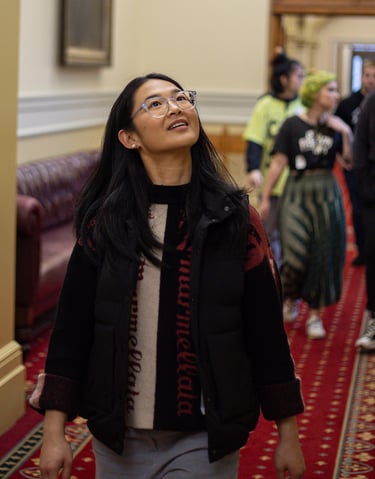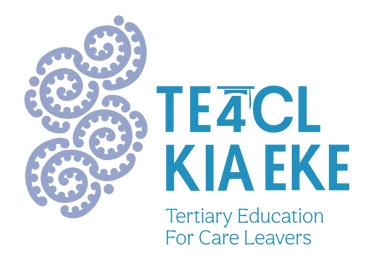Xixi
Bachelor of Health Sciences in Public Health, University of Auckland (2012-2016); Masters in Creative Arts Therapy, Whitecliffe College (2020-2022).
CARE EXPERIENCED VOICES
2/11/20245 min read


What did you study and why?
I didn’t really know what I wanted to do (career wise) after school and my close friend at school encouraged me to try out for med school (thanks for having so much faith in me). So I studied for one year of pre-med (Bachelor of Sciences in Biomedical Science with UoA) before transferring to Health Sciences because my grades weren’t good enough for med school but I still wanted to explore a career in the health sector. So I completed my undergraduate bachelor in Health Sciences.
After that, I still didn’t quite know what to do with such a broad degree. There were five pathways we could follow at the time, and I took an interest in the addictions and mental health pathway (given my upbringing in the foster care system and being exposed to this field directly and indirectly). So I did one more year in postgraduate studies in Health Sciences, specializing in alcohol and other drugs (AOD) studies. After that, I worked for about 5 years in the addictions health sector and realized that I was burning out and I didn’t want to do that for the rest of my life.
I have grown up with art all around me in my childhood in China, and wanted to try and reconnect with my culture and childhood dream abit more, so I took a leap of faith and did my masters in Creative Arts Therapy (with Whitecliffe) in the thick of COVID. And now I am doing abit more studies in professional supervision online so I can eventually support other budding therapists.
Why did you decide to study in tertiary education?
It was the most promoted pathway after school and I wanted to increase my chance to get a decent paying, stable job in life. It was also a comfort zone for me, being Chinese, it was drummed into my head to study hard and work hard, and tertiary education was the most sensible and responsible option after school. I had also won a scholarship to attend UoA, so I wanted to make the most of that opportunity. Ultimately it came down to survival for me because I knew that I had to fend for and look after myself because I didn’t have my biological family and foster family to rely on when I grow up.
What did you find the most challenging?
Studying was my joy and thorn. It was my safe space as it helped me to stay in my head and logic and away from emotions, so I used studies as a numbing escaping mechanism. It was something that I can control when everything felt outside of my control (being sent to NZ and sent into foster care without any say).
It was also challenging because English is not my first language so I had to work extra hard to catch up and understand terminologies and concepts, everything just took double the effort. I remember going to uni as soon as it opened and leaving just before they closed because we didn’t have internet access at the foster home. It was hard to make friends as well, because I was so stuck in my head and inner world and didn’t think anyone could relate or understand me; I definitely studied harder not smarter.
What did you find the most rewarding?
The sense of achievement and accomplishment, working towards and getting to the finish line. Being able to share my graduation ceremony and celebration with my biological and foster family. Being able to expand my knowledge and understanding of the world and develop personally and professionally, and slowly (re)write my story and not be defined by my past were rewarding.
What are you doing now?
I am currently working as a counsellor at a tertiary education and doing some contract EAP counselling and have just started some private counselling as well, and slowly building up my creative arts therapy practice. I am also doing some consultation and advocacy work in the foster care system (with the Ministerial Advisory Board at OT and Crown Response Unit) and have recently joined to be a board member with Voyce Whakarongo Mai. Oh, and I am a part of an amazing dance collective called Jang Huddle that is currently busy rehearsing for an Asian community contemporary dance show called “I Don’t Wanna Dance Alone” for the Auckland Arts Festival.
What are your future plans?
God willing, I would like to be fluent in my mother tongues of Mandarin and Cantonese (Chinese language) and try and work overseas, maybe support migrants and those who have displaced backgrounds also. I want to reconnect with my family and culture more, and hopefully continue to connect with the arts. I would like to have a stable home, build my own family and travel and see the world more.
What bit of advice would you give to someone care experienced considering tertiary education?
Your past may shape you, but don’t let it define you; the sky is the limit. Ask questions, try things and explore. Be ok with being vulnerable and ask for help, strong people ask for help. With the right support, mindset and faith, it is doable.
At UoA, I found rigour in the academic world. At Whitecliffe, I found an embrace for creativity and innovation. There is no one set path through tertiary education and learning is lifelong, it isn’t reduced to the four walls of university only; so long as you explore and be open to learning and growing.
What changes would you like to see for care leavers accessing in the future?
More grants and scholarships for CLs to access tertiary education, or apprenticeships, or arts residencies sports sponsorships etc; free/ subsidized mental health and medical support, mentoring and tutoring support. More holistic transition and adulting support. More support for CLs to have exchange opportunities overseas or to different parts of NZ, to see the world and to know that it is possible to not only survive, but to thrive in spite of their challenging backgrounds.
Just imagine everything that a tertiary student struggle with and will need support around (studylink, licence, banking, food/cooking, budgeting, relationships, sense of self, independence etc), and addition to that, CLs have the lack of adults and guidance and support in life after “ageing out” of care, as well as navigating past traumas etc. Equity is making sure that we (CLs) have the same start line as everyone else, so we don’t have to spend the rest of our lives playing catch up.
Is there anything else you want to tell us about your tertiary education experience?
I found that undergraduate study is becoming a bare minimum in this day and age, and I was grateful for the foundation and opportunity that it has set for me now. It gave me the opportunity to develop critical thinking, good routines, discipline and work ethics. And it wasn’t until postgraduate studies that I thrived I think, where you can be more specialized and focus on areas and topics that you are more interested in, and make more connection between your theoretical learning and the real life (through internships, placements, practicums etc).


